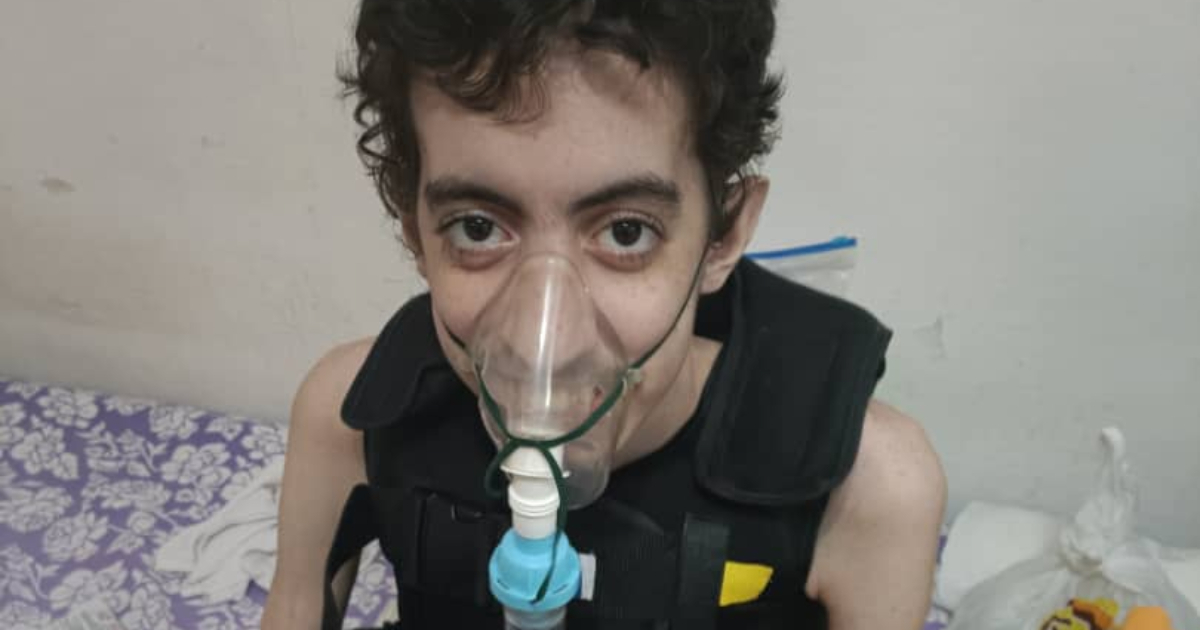The dire circumstances facing cystic fibrosis patients in Cuba have come to light through a heartfelt letter sent to our news outlet by a distressed citizen. This individual details the critical health status of his brother and condemns the lack of specialized care available for this genetic disease in the nation.
Manuel Alejandro Rojas Ramos, a 24-year-old battling cystic fibrosis, finds himself in a desperate situation at the Juan Bruno Zayas Surgical Clinical Hospital in Santiago de Cuba. According to the account, Manuel is experiencing severe respiratory failure, with lung function plummeting to a mere 25%. He is also battling multiple infections from resistant bacteria, including Staphylococcus aureus and Pseudomonas.
The letter laments the absence of broad-spectrum antibiotics crucial for combating these infections, asserting that the medications administered in the hospital have exacerbated bacterial resistance, endangering his brother's life. In this grim scenario, a lung transplant or access to genetic modulators are seen as Manuel's only hope, yet these options remain unattainable in Cuba.
The Broader Impact on Cystic Fibrosis Patients
Beyond Manuel's case, the letter highlights the systemic neglect impacting all cystic fibrosis patients in the country, leaving this population extremely vulnerable. The writer urgently calls for a humanitarian visa for Manuel to receive treatment abroad, hoping to save his life and draw attention to the challenges other patients face on the island.
Included below is the complete letter received by our editorial team:
Letter sent to CubaHeadlines:
Good evening,
I am reaching out through this medium out of desperation over my brother's current situation. He suffers from cystic fibrosis, a genetic disease that has hindered him from leading a full life since childhood. I hope to amplify his plight, which is shared by all patients with this illness here in Cuba, where they lack the specialized care they need, and are essentially being left to die.
His name is Manuel Alejandro Rojas Ramos, and he is 24 years old. Everything seems normal at first glance, but not when you realize he has cystic fibrosis. He is suffering from advanced respiratory insufficiency (his lungs operate at just 25% capacity) and is infected with Staphylococcus aureus, Pseudomonas, and some fungi.
He has been hospitalized for 60 days at the Juan Bruno Zayas Surgical Clinical Hospital in Santiago de Cuba. As of today, he does not have the broad-spectrum antibiotics needed to treat the bacteria ravaging his lungs.
Manuel's condition is increasingly critical, leaving no room for error in his treatment. Poor medication management at the hospital has strengthened bacterial resistance, and presently, only a lung transplant or the necessary genetic modulators can potentially save him, which is impossible in this country.
Thus far, we have only been able to extend his life through antibiotics, but they are no longer effective. What Manuel needs most right now is a humanitarian visa for treatment abroad.
I share this story hoping it can raise awareness of his situation and help save his life.
The Healthcare Crisis in Cuba
This complaint underscores the severe shortcomings of the Cuban healthcare system and the desperation families of patients feel, seeing publicizing their cases as their only hope for aid.
Understanding Cystic Fibrosis
Currently, there is no definitive cure for cystic fibrosis, but medical advancements have significantly improved the quality and lifespan of those affected by this disease. It is a genetic disorder primarily impacting the lungs and digestive system due to the buildup of thick, sticky mucus in various organs.
Available Treatments
While a cure remains elusive, several treatments exist to effectively manage the disease:
- CFTR Modulator Medications: Drugs like ivacaftor, lumacaftor, or tezacaftor correct the underlying defect in certain CFTR gene mutations causing cystic fibrosis.
- Respiratory Therapies: These include airway clearance exercises, inhaled medications, antibiotics, and supplemental oxygen.
- Nutrition and Pancreatic Enzymes: These help individuals with cystic fibrosis absorb nutrients properly.
- Lung Transplant: In advanced cases, this procedure can enhance life quality.
Research is ongoing, with genetic and cellular therapies in development that could potentially offer solutions closer to a cure in the future, aiming to repair or replace the defective gene causing the disease.
Given this unfortunate situation, it is important to note that Cuba currently faces a severe shortage of medications and supplies, alongside a lack of specialists, inadequate hospital conditions, and government unwillingness to change a reality impacting millions.
FAQs About Cystic Fibrosis in Cuba
What are the main challenges faced by cystic fibrosis patients in Cuba?
Patients in Cuba face severe challenges due to a lack of specialized care, shortage of necessary medications, and inadequate healthcare facilities, exacerbating their health conditions.
Why is a humanitarian visa crucial for Manuel Alejandro Rojas Ramos?
A humanitarian visa is crucial for Manuel as it would allow him to seek essential medical treatment abroad, potentially saving his life given the lack of resources in Cuba.
What treatments are available globally for cystic fibrosis?
Globally, treatments include CFTR modulator medications, respiratory therapies, nutritional support, and in advanced cases, lung transplants to improve quality of life.
